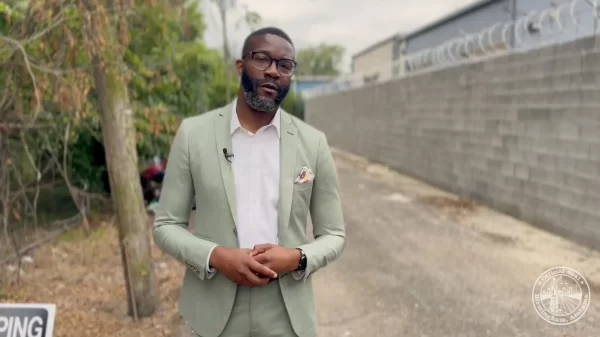|
Getting your Trinity Audio player ready...
|
Services have launched for a hospital-linked violence intervention pilot program to support survivors of gun violence in a hospital setting.
The year-long pilot program Violence Intervention and Prevention Partners, or VIP2, provides violence intervention specialists who assist in the delivery of case management services, including meeting with survivors of gun violence, providing connections to social, medical and mental health services and monitoring survivors’ progress over time.
The service provider, Offender Alumni Association (OAA), received a $1.1 million grant in 2022 awarded through the Jefferson County Department of Health (JCDH) Public Health Advised Fund at the Community Foundation of Greater Birmingham. The City of Birmingham has committed $2.1 million for years two and three of the program. The University of Alabama at Birmingham Hospital is the pilot facility for the program. The UAB Division of Trauma and Acute Care Surgery identifies and refers consenting patients to VIP2. Patients who are Jefferson County residents between the ages of 19-39 and who have survived a non-self-inflicted gunshot injury engage with violence intervention specialists while still in the hospital. Specialists coordinate with the outpatient clinical team for follow-up once the patient is discharged.
The objectives of VIP2 are to reduce subsequent acts of violence involving the clients, improve client health outcomes and enhance client educational attainment, employability and employment status.
“OAA’s vision has always been to reduce crime and restore communities,” said Deborah Daniels, the co-founder and executive director of OAA. “We realize that violence never has a winner and that it never affects one person, but it destroys families and communities. VIP2 is designed to demonstrate that through unity we can address this public health crisis.”
“Violence has not been an area of focus for JCDH historically, but we recognized that it is a major public health problem that is having a devastating effect on individuals, families and whole communities,” said Mark Wilson, MD, Jefferson County Health Officer. “We made it a priority to find a way to help address it. Violence is an extremely complex and stubborn problem, but we are hopeful that VIP2 will be an important part of the solution.”
“We are glad to see this program active in our community. The city has established multiple programs in the past year to focus on prevention and reentry as well as enforcement. VIP2 is a vital part of this strategy,” Birmingham Mayor Randall L. Woodfin said. “I am thankful to Dr. Wilson, JCDH and UAB for partnering to make this a reality. I am appreciative of the services OAA will provide to gunshot survivors in an effort to reduce acts of violence.”
“Gun violence has truly become a national public health issue,” said Jeffrey Kerby, M.D., Ph.D., director of the UAB Division of Trauma and Acute Care Surgery and chair of the American College of Surgeons Committee on Trauma. “My colleagues in trauma care across the country are searching for ways to break the cycle of violence and reduce the impact of gun violence on our communities. We firmly believe that reaching out to victims of gun violence with counseling and intervention by the trained specialists with VIP2 while they are still hospitalized has the potential to be a difference-maker.”
JCDH sought assistance from the Health Alliance for Violence Intervention to assist stakeholders with planning the program.
There are more than 30 hospital-based violence intervention programs in the United States. Studies have shown that programs of this type are successful in reducing the number of repeat injuries. The largest such study in Chicago found that more than 20 percent of victims of gun violence had a repeat injury within six months, against only eight percent of those who had undergone an intervention program.
VIP2 will include data collection and evaluation to determine how well objectives are being met.






















































